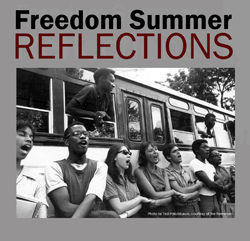
Editor’s note: Unknown to Edith Lee-Payne for several decades, a photo taken of her by Rowland Scherman as she listened to King's “I Have a Dream” speech when she was 12 years old became an iconic image of the March on Washington for Jobs and Freedom.
It is believed the historic Aug. 28, 1963, March on Washington for Jobs and Freedom attended by over 250,000 people, bringing attention to discrimination in southern parts of the country, was instrumental in the passing of and subsequent signing of the Civil Rights Act by President Lyndon Johnson on July 2, 1964.
Thankfully, I was among the 250,000 listening to Dr. Martin Luther King, Jr. introduce to the world the injustices in the South that contradicted the promises of life, liberty, and the pursuit of happiness contained in our Charters of Freedom.
With the huge sense of pride and honor celebrating the 50th commemoration of the 1963 March on Washington last year comes an equal honor and pride that this significant landmark legislation has broken the barriers for a better quality of life for all Americans.
This legislation has enabled people of color and women to participate in the simplest of life's privileges, to hold some of the highest positions in corporate America, to live in neighborhoods previously only dreamed of and to attend colleges and universities to attain the greatest heights imaginable.
I stood only yards from Dr. King on the steps of the Lincoln Memorial on Aug. 28, 1963, as he delivered the "I Have A Dream" speech. It was unfathomable that 50 years later I would again stand only yards away from the most powerful person in the world as the first elected black U.S. President Barack Obama delivered the "Let Freedom Ring" speech in which he reminded us of the promise made at our founding:
“We hold these truths to be self-evident, that all men are created equal, that they are endowed by their Creator with certain unalienable rights, that among these are life, liberty, and the pursuit of happiness.”
Courage, spirit and hope; the personal and for some, ultimate, sacrifices made by men, women, and children who believed in equality for all and the demonstrations, boycotts and marches led to the enactment of the Civil Rights Act.
Frederick Douglass said, “Freedom is not given, it must be won, through struggle and discipline, persistence and faith.” Dr. King said, “Our lives begin to end the day we become silent about things that matter.”
The Civil Rights Act should be remembered and recognized for the sacrifice, struggle, discipline, persistence and faith of those who were not silent about things that mattered. We should never forget and we should never be silent.
Lee-Payne is a civil rights advocate and member of Hope United Methodist Church in Southfield, Michigan.
News media contact: Kathy L. Gilbert, Nashville, Tenn., (615) 742-5470 or [email protected].
Like what you're reading? Support the ministry of UM News! Your support ensures the latest denominational news, dynamic stories and informative articles will continue to connect our global community. Make a tax-deductible donation at ResourceUMC.org/GiveUMCom.





